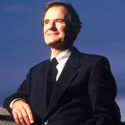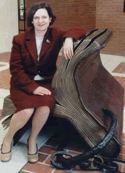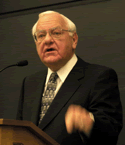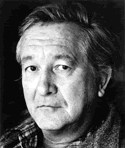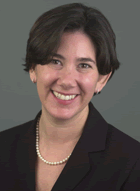
 |
||
The Yale Alumni Magazine is owned and operated by Yale Alumni Publications, Inc., a nonprofit corporation independent of Yale University. The content of the magazine and its website is the responsibility of the editors and does not necessarily reflect the views of Yale or its officers. |
David Boies '66LLB, an attorney known for his role in high-profile cases involving Microsoft, Napster, and the 2000 presidential election, came to campus on April 16 at the invitation of the Yale Law and Technology Society. Pointing out the difficulties the legal system is having with technological change, Boies said that there were issues in the Napster case “that the court could not understand in the limited amount of time they had. Peer-to-peer technology was unlike anything they had seen before.”
Richard Schottenfeld '71, ’76MD, is returning to Davenport College this summer, but he’ll have more spacious quarters than in his student days: Schottenfeld was named master of Davenport this spring, succeeding Gerald Thomas. Schottenfeld, a professor of psychiatry and substance-abuse specialist at the School of Medicine, has been on the faculty since 1978. His wife, Tanina Rostain '83MA,'87JD, is a law professor at the New York Law School; she will serve as the college’s associate master. They have two children.
The nine million volumes in the Yale library system surely won’t intimidate new University librarian Alice Prochaska; she has spent nearly a decade as director of special collections at the much larger British Library in London. Prochaska, who holds a PhD in modern history from Oxford, was secretary and librarian at the University of London’s Institute of Historical Research from 1984 to 1992. At Yale, she succeeds Scott Bennett, who is retiring after seven years in the post.
“I was once a staunch supporter of the death penalty,” said Illinois governor George Ryan in a Law School address on April 16. “But the more I learn about it, the more troubled I become.” Ryan, a conservative Republican, declared a moratorium on executions in Illinois last year after a 13th death-row inmate was exonerated by new evidence. He has appointed a commission to study Illinois’s justice system for capital crimes, but he expressed skepticism that the death penalty can be administered fairly. “I’m not sure the system can be fixed,” he said.
“I am living proof that people can recover and do recover,” said author William Styron at a Branford College master’s tea on April 10, referring to his bout with depression. Styron, whose works of fiction include Sophie’s Choice and The Confessions of Nat Turner, wrote about his affliction in Darkness Visible, a 1990 memoir. He believes “that there is a correlation between creativity and depression, especially manic-depression.”
At a Silliman College master’s tea on April 20, Survivor champion Richard Hatch was asked who would have won if the game had truly been about survival skills rather than interpersonal relationships. “It would have been me, because I was fat and because I could catch fish.” Hatch, a management consultant, criticized the cast of this year’s edition as “too pretty and marketable. On the first one, we were goofy, fat, and weird, and that was better.” Close-Up: Worldly Spokesperson On her third day as Yale’s new director of public affairs, Helaine Klasky entered a meeting carrying a video tape. “It’s The West Wing, “ said Klasky, referring to the White House-based television drama. “Someone taped it for me. Got to have my fix.” The show hits close to home for Klasky, who, like her two predecessors in the job, comes to Yale from Washington, D.C., where she has spent her career working in government. Most recently, she was deputy assistant secretary for public affairs in the Clinton treasury department.
A native of California who got an undergraduate degree in political science from the University of California at Berkeley, Klasky hazards a guess as to why the University is keen on Washington insiders for the public affairs job—even after both Lawrence Haas and B.J. Cooper returned to the capital less than two years after coming to Yale. “I think they’re looking for people who are used to working hard and working in a fast-paced but eclectic environment,” she says. For a University that is intent on becoming a global institution, Klasky’s experience in international affairs was also a selling point. She holds a master’s degree in international relations from American University, and she has worked in the Office of the U.S. Trade Representative and at the State Department. Accordingly, Klasky stresses international issues when she talks about her goals in her job. “We want to show the world why their best and brightest should come to Yale,” she says, “and we want to reach out here to American students to show that Yale is a great global institution.” |
||||||||||||||||
|
|
|
|
|
|
|
|
©1992–2012, Yale Alumni Publications, Inc. All rights reserved. Yale Alumni Magazine, P.O. Box 1905, New Haven, CT 06509-1905, USA. yam@yale.edu |
||
